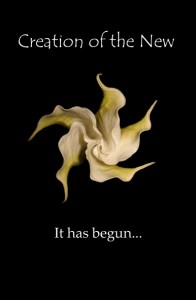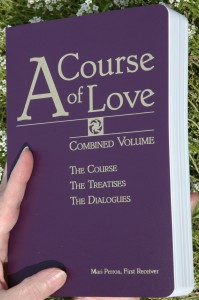 Be jubilant rather than hesitant about the time of discovery that is before you. Calling what you think you know into question is not a call to return to uncertainty, but a call to allow real certainty to come. D:6.16
Be jubilant rather than hesitant about the time of discovery that is before you. Calling what you think you know into question is not a call to return to uncertainty, but a call to allow real certainty to come. D:6.16
How do I release myself from the thoughts that are taking me away? Well, they’re not really thoughts. They’re ideas. A brazillion tumbling ideas. Are they taking me away “like a stream carries water?” Or are they taking me away by distracting me from what’s in front of me?
Driving through Marin on my trip up the coast of California, I thought of Anne Lamott. She told me years ago to look out the window. “Look out the window. Keep writing.” Am I meant to watch the squirrel’s see-through tail glowing in the morning sun—with, or without—the damn ideas? I return my view to the table and to Creation of the New. I read it because ideas and thinking feel too closely linked right now, and I can’t think when reading it.
“There is this and there is that. The babe. The world.” (Creation of the New)
Last night I had a dream, or a waking little set of ideas, or maybe what accounted for a dialogue with Christ-consciousness. Where does the division lie?
You don’t need me. Your answers lie within. You need to share to get them out
Lord, I say, I am not still.
I need quiet. And I am not still. I am not being allowed my stillness. Ideas well up. Spill over. Which way to go.
I hear . . . or remember . . . Ideas are birthed. Ideas leave not their source.
Parker Palmer, in Letting Your Life Speak, said, “Clues, by definition, are coded and must be deciphered.” Remembering this, and not what comes next, I go back to the book to see. What comes next for him? In his narrative, he returns to his early life, the professions he saw himself in, professions he knows he would have been miserable in, yet in which he sees “clues” to his future anyway. Hmmm.
Looking up the word decipher I can hardly believe it’s definition:
Decipher: To translate (a message in cipher or code) into ordinary, understandable language. To make out the meaning of.
Whoa and wow! Isn’t that what we’re all doing with A Course of Love? Translating the messages we’re receiving from it into the meaning they have for our own lives and for new living?
 Reading Creation is like going into the parts of ACOL that hold the greatest mystery. There are other books that have done for me what Creation is doing at the moment. I spent probably half a year with DH Lawrence for that reason not long ago. These are works that break me out of my own “mind-set,” out of the usual tracks in which my thoughts and ideas flow. This is, at least, what I suspect they do for me. I can’t say for certain. But I feel that what this has given me is a clue to the clues. They are messages in code. Messages that come in new patterns.
Reading Creation is like going into the parts of ACOL that hold the greatest mystery. There are other books that have done for me what Creation is doing at the moment. I spent probably half a year with DH Lawrence for that reason not long ago. These are works that break me out of my own “mind-set,” out of the usual tracks in which my thoughts and ideas flow. This is, at least, what I suspect they do for me. I can’t say for certain. But I feel that what this has given me is a clue to the clues. They are messages in code. Messages that come in new patterns.
Just after writing this I open A Course of Love. I read, “You need not return to old patterns.” I feel suddenly and fully comforted in the reading I so appreciate, the reading that takes me away from my mind’s old patterns. This renews my confidence that something in me knows what I’m doing. As I release the old thought patterns, I can better welcome the new. From The Dialogues, Chapter 4:
What is one, or in union with all, draws from the well of divine design. You need not turn to old  patterns or systems to accomplish your release. You can only turn to what is, to what is left now that the patterns and systems of learning are no longer. You accept that what has been given is available. You accept and you receive. You realize that the first order of creation of the new is restoration of the original order, or original design. As you have been returned to your Self, now your life must be returned to where it fits within the divine design, to where it is a life of meaning and purpose. This return is the return of wholeness. This return is not selfish on your part, but magnanimous. It returns wholeness to you and wholeness to the divine design. It returns creation to what it is. D:4.28-29
patterns or systems to accomplish your release. You can only turn to what is, to what is left now that the patterns and systems of learning are no longer. You accept that what has been given is available. You accept and you receive. You realize that the first order of creation of the new is restoration of the original order, or original design. As you have been returned to your Self, now your life must be returned to where it fits within the divine design, to where it is a life of meaning and purpose. This return is the return of wholeness. This return is not selfish on your part, but magnanimous. It returns wholeness to you and wholeness to the divine design. It returns creation to what it is. D:4.28-29
In whatever way I find release of the old, I welcome the new. I don’t have to throw the new ideas out, just the patterns of thought that sometimes cling to them. Release comes for me in the mystery of mystical writing, or the rhythm of another’s voice. It is what poetry and art and music do. It’s like they turn off the  old pattern but leave the new idea. Whichever way of release is ours, it can return us to being the new babe. The babe newly birthed into union.
old pattern but leave the new idea. Whichever way of release is ours, it can return us to being the new babe. The babe newly birthed into union.
All ideas here are but ideas of union come to replace ideas of separation. C:11.4


